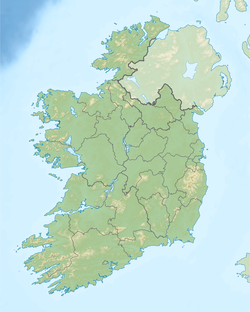Cork
Corcaigh | |
|---|---|
City | |
 From top, left to right: City Hall, the English Market, Quadrangle in UCC, the River Lee, Shandon Steeple | |
| Nicknames: The Rebel City, Leeside, The Real Capital | |
| Motto(s): | |
 | |
| Coordinates: 51°53′50″N 8°28′12″W / 51.89722°N 8.47000°W | |
| State | Ireland |
| Province | Munster |
| Region | Southern |
| County | County Cork |
| Founded | 6th century AD |
| City rights | 1185 AD |
| Government | |
| • Local authority | Cork City Council |
| • Lord Mayor | Kieran McCarthy (Ind) |
| • Local electoral areas |
|
| • Dáil constituencies | |
| • European Parliament | South |
| Area | |
• City | 187 km2 (72 sq mi) |
| • Urban | 174 km2 (67 sq mi) |
| • Metro | 820 km2 (320 sq mi) |
| Population | |
• City | 224,004 |
| • Density | 1,188/km2 (3,080/sq mi) |
| • Metro (2017) | 305,222[4] |
| • Demonym | Corkonian or Leesider |
| Time zone | UTC0 (WET) |
| • Summer (DST) | UTC+1 (IST) |
| Eircode | T12 and T23 |
| Area code | 021 |
| Vehicle index mark code | C |
| Website | Official website |
 | |
Cork (Irish: Corcaigh [ˈkɔɾˠkəɟ]; from corcach, meaning 'marsh')[6] is the second largest city in Ireland, the county town of County Cork, the largest city in the province of Munster and third largest on the island of Ireland. At the 2022 census, it had a population of 224,004.[5]
The city centre is an island between two channels of the River Lee which meet downstream at its eastern end, where the quays and docks along the river lead outwards towards Lough Mahon and Cork Harbour, one of the largest natural harbours in the world.[7][8]
Cork was founded in the 6th century as a monastic settlement, and was expanded by Viking invaders around 915. Its charter was granted by Prince John in 1185. Cork city was once fully walled, and the remnants of the old medieval town centre can be found around South and North Main streets. The city's cognomen of "the rebel city" originates in its support for the Yorkist cause in the Wars of the Roses.[9] Corkonians sometimes refer to the city as "the real capital",[10] a reference to its opposition to the Anglo-Irish Treaty in the Irish Civil War.[11]
- ^ statiō bene fīdā carīnīs: literally "a good trust-station for keels", adapted by inversion from Virgil's Aeneid (II, 23: statio male fida carinis, "an unsafe harbour"). Sometimes corrupted to "fide".
- ^ "Cork City Coat of Arms". Cork City Council. Archived from the original on 15 September 2015. Retrieved 21 February 2016.
- ^ "Cork City's population to grow by 85,000 and expand fivefold ... at midnight". irishexaminer.com. Irish Examiner. 30 May 2019. Archived from the original on 11 April 2020. Retrieved 31 May 2019.
- ^ "Cork 2050 Main Report" (PDF). Cork County Council. Cork County Council & Cork City Council. March 2017. Archived (PDF) from the original on 25 November 2020. Retrieved 12 November 2018.
- ^ a b "Interactive Data Visualisations: Towns: Cork City and Suburbs". Census 2022. Central Statistics Office. Retrieved 19 February 2024.
- ^ Patrick Weston Joyce (1923). Irish Local Names. Archived from the original on 2 October 2019. Retrieved 2 October 2019 – via libraryireland.com.
- ^ "RTÉ Television – The Harbour". RTÉ.ie. Archived from the original on 19 June 2017. Retrieved 12 August 2010.
- ^ "Coastal & Marine Resources Centre – Cork Harbour Marine Life Research Project Report". Cmrc.ucc.ie. Archived from the original on 29 February 2016. Retrieved 12 August 2010.
- ^ John Paxton (2000), The Penguin encyclopedia of places (3 ed.), Penguin, ISBN 978-0-14-051275-5
- ^ "Cork's small problem: the real issue for the real capital is its size". Irishtimes.com. 7 April 2015. Archived from the original on 18 November 2015. Retrieved 17 November 2015.
- ^ "The battle for Cork City, August 1922 – Interview with John Borgonovo". The Irish Story. Archived from the original on 4 June 2020. Retrieved 22 May 2016.


